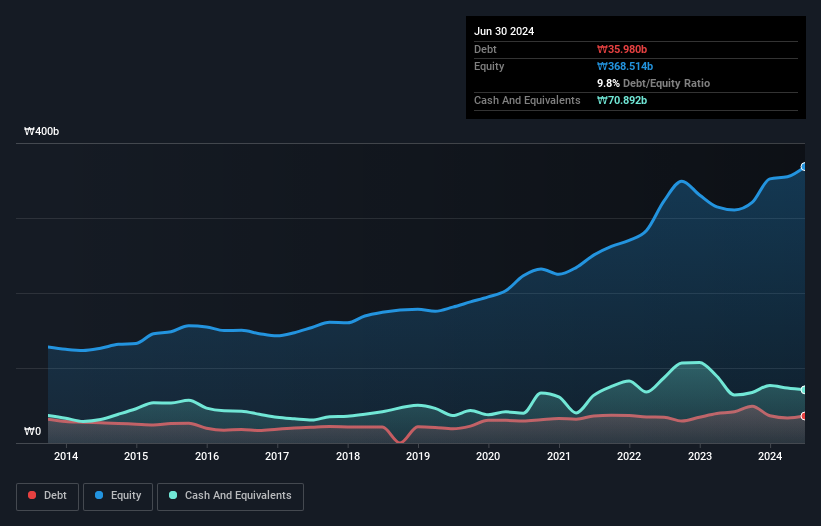Some say volatility, rather than debt, is the best way to think about risk as an investor, but Warren Buffett famously said that 'Volatility is far from synonymous with risk.' When we think about how risky a company is, we always like to look at its use of debt, since debt overload can lead to ruin. We can see that TSE Co., Ltd (KOSDAQ:131290) does use debt in its business. But the more important question is: how much risk is that debt creating?
Why Does Debt Bring Risk?
Debt and other liabilities become risky for a business when it cannot easily fulfill those obligations, either with free cash flow or by raising capital at an attractive price. Part and parcel of capitalism is the process of 'creative destruction' where failed businesses are mercilessly liquidated by their bankers. While that is not too common, we often do see indebted companies permanently diluting shareholders because lenders force them to raise capital at a distressed price. Of course, plenty of companies use debt to fund growth, without any negative consequences. The first step when considering a company's debt levels is to consider its cash and debt together.
View our latest analysis for TSE
What Is TSE's Net Debt?
As you can see below, TSE had ₩36.0b of debt at June 2024, down from ₩41.6b a year prior. But on the other hand it also has ₩70.9b in cash, leading to a ₩34.9b net cash position.

How Strong Is TSE's Balance Sheet?
We can see from the most recent balance sheet that TSE had liabilities of ₩66.5b falling due within a year, and liabilities of ₩33.7b due beyond that. On the other hand, it had cash of ₩70.9b and ₩79.4b worth of receivables due within a year. So it actually has ₩50.2b more liquid assets than total liabilities.
This surplus suggests that TSE has a conservative balance sheet, and could probably eliminate its debt without much difficulty. Simply put, the fact that TSE has more cash than debt is arguably a good indication that it can manage its debt safely.
Even more impressive was the fact that TSE grew its EBIT by 635% over twelve months. That boost will make it even easier to pay down debt going forward. When analysing debt levels, the balance sheet is the obvious place to start. But it is future earnings, more than anything, that will determine TSE's ability to maintain a healthy balance sheet going forward. So if you're focused on the future you can check out this free report showing analyst profit forecasts.
Finally, a company can only pay off debt with cold hard cash, not accounting profits. TSE may have net cash on the balance sheet, but it is still interesting to look at how well the business converts its earnings before interest and tax (EBIT) to free cash flow, because that will influence both its need for, and its capacity to manage debt. Over the last three years, TSE saw substantial negative free cash flow, in total. While investors are no doubt expecting a reversal of that situation in due course, it clearly does mean its use of debt is more risky.
Summing Up
While it is always sensible to investigate a company's debt, in this case TSE has ₩34.9b in net cash and a decent-looking balance sheet. And we liked the look of last year's 635% year-on-year EBIT growth. So we don't have any problem with TSE's use of debt. The balance sheet is clearly the area to focus on when you are analysing debt. But ultimately, every company can contain risks that exist outside of the balance sheet. Case in point: We've spotted 1 warning sign for TSE you should be aware of.
When all is said and done, sometimes its easier to focus on companies that don't even need debt. Readers can access a list of growth stocks with zero net debt 100% free, right now.
Valuation is complex, but we're here to simplify it.
Discover if TSE might be undervalued or overvalued with our detailed analysis, featuring fair value estimates, potential risks, dividends, insider trades, and its financial condition.
Access Free AnalysisHave feedback on this article? Concerned about the content? Get in touch with us directly. Alternatively, email editorial-team (at) simplywallst.com.
This article by Simply Wall St is general in nature. We provide commentary based on historical data and analyst forecasts only using an unbiased methodology and our articles are not intended to be financial advice. It does not constitute a recommendation to buy or sell any stock, and does not take account of your objectives, or your financial situation. We aim to bring you long-term focused analysis driven by fundamental data. Note that our analysis may not factor in the latest price-sensitive company announcements or qualitative material. Simply Wall St has no position in any stocks mentioned.
About KOSDAQ:A131290
TSE
Provides semiconductor test solutions in South Korea and internationally.
Flawless balance sheet with proven track record.
Similar Companies
Market Insights
Community Narratives



